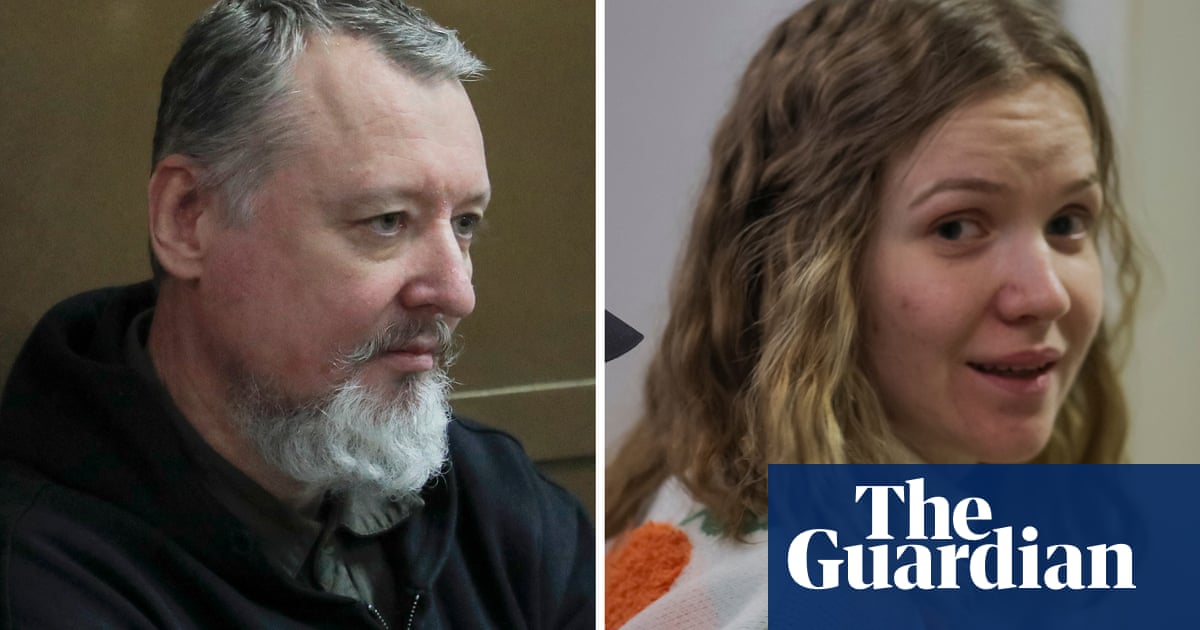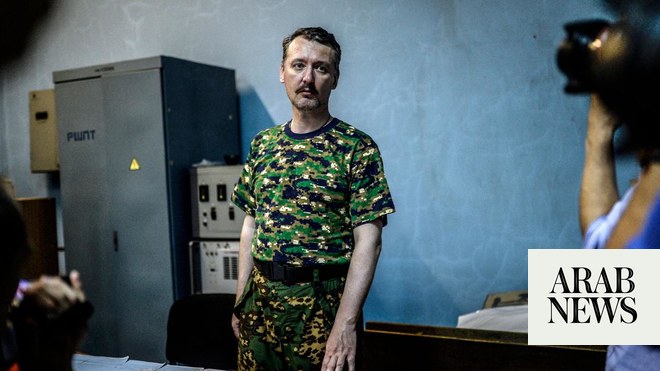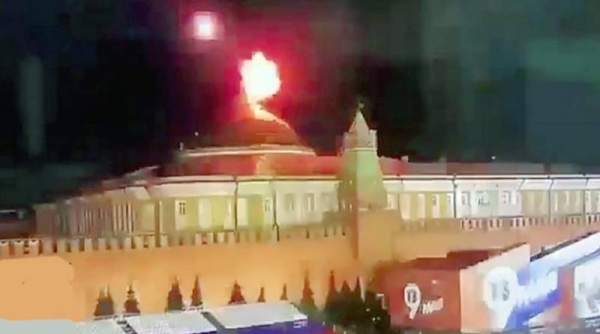
Russian courts have jailed a prominent ultra-nationalist critic of Vladimir Putin and, separately, a woman convicted over a blast that killed a pro-war blogger.
In Moscow, a court sentenced Igor Girkin, a former battlefield commander of Russian proxy forces in east Ukraine who was convicted by a Dutch court over the shooting down of flight MH17, to four years in jail on extremism charges prompted by his criticism of the Russian war effort in Ukraine.
Girkin, who also goes by the nom de guerre Strelkov, was a leading military commander of the pro-Russian forces who occupied eastern Ukrainian cities beginning in 2014. His armed intervention backed by Russia marked the beginning of the conflict in Ukraine.
A former officer for Russia’s FSB security service, Girkin was arrested last summer in his apartment and charged with “calls for extremism” after months of public criticism in which he accused Putin of failing to pursue the war in Ukraine with enough vigour.
His arrest and subsequent jailing is seen as a sign that the Kremlin has decided to clamp down on any dissent, even among those who support Moscow’s invasion.
Girkin was previously found guilty in absentia by a Dutch court of the murder of 298 people onboard flight MH17, the plane shot down while flying over east Ukraine in July 2014.
The Dutch court gave him a life sentence for his role in sending a Buk surface-to-air missile system controlled by Russia to a field near the village of Pervomaisky from where it fired on the passenger jet. Russia has been accused of harbouring Girkin.
Piet Ploeg, who heads a foundation representing Dutch MH17 victims, said he had mixed feelings over Girkin’s sentencing on Thursday.
“It feels very double – he is jailed but not for the right reasons. He should be in a Dutch prison for his role in the MH17 shoot-down, and not for voicing his opinion,” Ploeg, whose brother, sister-in-law and nephew were killed in the MH17 crash, told the Guardian. “Unfortunately, he might never face the justice he deserves in the Netherlands.”
Since the start of Russia’s invasion, Girkin has emerged as one of the most prominent voices within a group of ultra-nationalist and pro-war bloggers who have taken to berating the Kremlin for its military failures in Ukraine.
On his Telegram channel, followed by more than 760,000 people, Girkin frequently accused the Kremlin of not going far enough in its war in Ukraine and called for a total mobilisation of Russian society and its economy to support the war effort.
Girkin also rallied against Putin, calling him a “nothingness who managed to throw dust in the eyes of a large portion of the population”, and he urged Putin to pass power “to someone truly capable and responsible”.
Some of Girkin’s rhetoric echoed that of the late Wagner head Yevgeny Prigozhin, who was similarly critical of Russia’s military leadership and the defence ministry.
Girkin was arrested a month after Prigozhin’s failed mutiny, in what many observers saw as a move by the Kremlin to crack down on influential ultra-nationalists after the Wagner uprising. Many of the pro-war commentators have since fallen in line with the Kremlin, toning down their critical rhetoric.
In a separate case on Thursday, a Russian woman was jailed for 27 years for delivering a bomb that exploded in the hands of a pro-war military blogger last year.
Darya Trepova, 26, was convicted by a St Petersburg court of charges including terrorism in connection with the death of the popular pro-war blogger Vladlen Tatarsky. Her sentence is one of the longest given to a woman in modern Russian history.
Tatarsky, whose real name was Maxim Fomin, was hosting a discussion with other rightwing commentators at a cafe on the banks of the Neva River in the historic heart of St Petersburg when he was killed.
Footage published at the time showed Trepova handing Tatarsky a statuette out of a box – a small figurine in his likeness and painted gold – followed by a large explosion.
Trepova claimed at the trial that she was set up, saying she did not know there was an explosive device in the bust and thought the statuette contained a listening device, not a bomb.
She said she was acting under orders from a man in Ukraine whom she knew as “Gestalt” (German for “shape”), who had been sending her money and instructions for several months. She pleaded not guilty to the terrorism charge.
Several Russian pro-war commentators have been targeted inside Russia since the start of the war. Moscow accused Kyiv of the murder of Darya Dugina, the daughter of an ultra-nationalist Russian ideologue, who was killed when a bomb blew up the Toyota Land Cruiser she was driving.
Ukraine has denied involvement in the killings.












